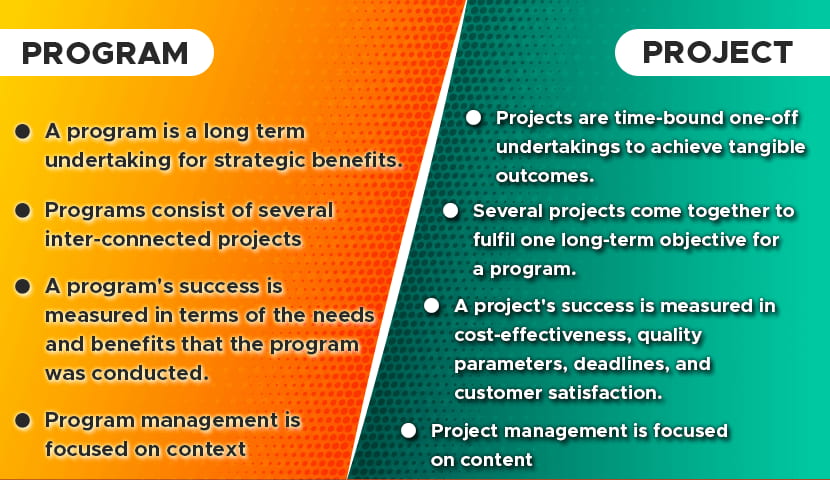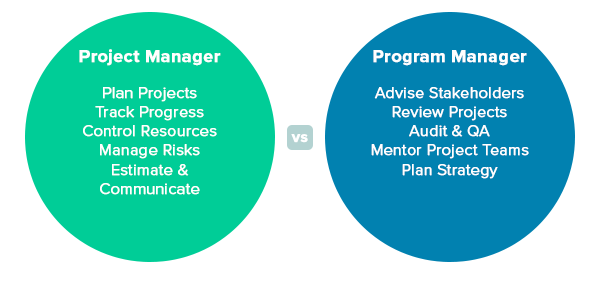Programs and projects can be used interchangeably sometimes in our everyday lives, but in the working environment, the difference in their meaning is rather essential. They require different approaches and techniques, and project managers and program managers can have quite different job descriptions.
If you’re looking for a thorough comparison of project management vs program management, you’ve come to the right place. Using tools like a free time card calculator can also assist in managing timelines effectively, but the two roles have distinct applications that set them apart.
Project Management vs Program Management: Overview
Program vs Project definitions
First, take a look at the difference between a project and a program. A project is temporary and has an evident beginning and projected end. This also means that the scope and resources for a project also have to be clearly defined. Unlike a program, projects are not for the daily operation of a workplace. Projects are executed with a particular goal in mind and have a specific process that will help to map out how to achieve that goal.
Meanwhile, programs are initiated for the success of an organization itself. Meaning that programs are made to last. It has also been found that organizations with established program management are typically much more successful than those without. Beyond project and program management, there is also product management and portfolio management.

Project vs Program: basic differences
Program management can be viewed as a large project in itself or a set of projects and is meant to be integrated into the day-to-day life of an organization as a long-term goal. Meanwhile, project management is short-term and follows a specific process, and has an end goal focused on the output of the project.
A project can be equated to playing checkers while a program is more like playing chess.
Though a program can follow the same processes of project management, it is meant to have long-term effects and outcomes. Programs are ongoing and don’t require an end date as projects do. Programs are meant to be integrated into your organization and used for further work.
Program management can be seen as the overarching management of projects made to improve the overall performance of an organization. This improvement is typically measured by the benefits and outcomes that it brings to your organization. The benefits of program integrations include, but are not limited to:
- increased income
- increased profits
- decreased costs
- improved market position
- reduced wastage or environmental damage
- customer satisfaction
Programs can continually evolve based on the benefits and outcomes that they are producing. Meanwhile, projects are more straightforward and more focused on the output that they create.
Project Management vs Program Management: Breakdown
Understanding Project Management and its Processes
Project management follows a process whether everyone is aware of it or not. The steps are usually:
Initiating – > Planning – > Execution -> Monitoring -> Closing
1️⃣ Initiating is the base of any project and begins with an idea, suggesting it, and acting on it. From there, begins the planning or project portfolio process, which is necessary to identify the goal, the resources available, and the timeline of the project.
2️⃣ The planning process will assist in setting milestones so your team doesn’t get sidetracked or spend too much time on one part of your project.
3️⃣ Next is execution which is the main part of any project. In the executing process, your team may work together or separately towards a common goal. Different team members may work on different aspects simultaneously to help a project come together quicker.
4️⃣ Execution is closely followed by monitoring and controlling the project to ensure that each part of the project is completed and seamlessly integrated into the next aspect. After all these processes are followed comes the closing of the project.
5️⃣ The closing of a project is not just a conclusion but also a reflection of the project management process where one can determine the best practices to use again for the next project.
You can also browse project manager job descriptions & check the responsibilities of specific positions here.
There are task-based applications that allow you to track and manage projects, such as Asana and more. For some organizations, they may use multiple different applications to utilize all these features at a given time. There are some applications that integrate both the project tracking and the communication features, such as Nifty. Another useful application may be a time tracking one such as Everhour. The use of these programs is incredibly beneficial for the streamlining of projects and keeping team members in contact.
Program Management: Strategic Oversight for Long-Term Success
Any good program management comes with these traits: consensus building, risk assessment, and attention to detail. Consensus building is necessary to ensure all team members working on a project or program are headed in the right direction and have a complete understanding of the goal trying to be achieved. Risk assessment is typically done by program managers and is done to track or spot risks before they occur. By staying ahead of potential issues, your program will continue to run smoothly and without interruption, if done correctly. Attention to detail is necessary for the success of any organization but is especially relevant to your program management as you track progress and stay connected to budgets and deadlines.
Program management sometimes can serve as where budget management occurs. As program management maps out the use of resources and can also cut down on costs while bringing in more revenue, it’s no question that your budget will be evolving with your program.
Program Managers vs Project Managers
Though the jobs of program managers and project managers may seem similar, they have their key differences. Project managers are professionals that are tasked with the position of planning and organizing resources and personnel for individual projects. Project managers can be found in any industry whether it may be contractors, managers, employees, or possibly independent consultants. Typically, project managers will report to the program manager on the status of projects.
Program manager responsibilities
Program managers have the duty of communicating a program strategy and its objectives while also assessing how it will impact a business. They set the framework that all other employees should follow for success in their projects. Project managers will then follow this set framework and report back to program managers on projects. This allows program managers to monitor the “bigger picture” of the business as a whole rather than being specifically focused on certain projects that have their own managers.
Project manager responsibilities
Project managers, alternatively, oversee the operation of individual projects within their programs. These managers may determine time, budget, resources, and other aspects to complete a project within the set program guidelines. They have most of their focus on the execution and management of projects which they then report on.
Program manager responsibilities vs. Project manager responsibilities
Program managers are more architects of the framework of the day to day life while project managers are the hands-on workers that pull individual projects together. Project managers need to manage specific work so that they can report on it to the program manager. The program manager can then supervise multiple projects at any given time to ensure the program guidelines are being fulfilled. Program managers tend to need a focus on strategy as that is the whole point of integrating a program. Project managers are more focused on tact to complete projects within their assigned deadlines.
The Bottom Line
Overall, many of the components of project management and program management overlap. They have more similarities than they do differences but the main idea that sets them apart when comparing project management vs. program management is that program management is the “bigger picture” and can include project management and its parts under it.
The differences are primarily in the length of time they last and their end goals. Projects are finite and focus on output while programs are meant to be integrated and evolve with your organization. A program is made to focus on the outcomes and increase benefits, whether it be cost reduction, more customer satisfaction, or improving the quality of work.
If you are managing a team of 5 or more and looking to boost efficiency, Everhour is the perfect tool to keep your team on track. With seamless time tracking, you can easily apply bottom-up estimating for your project durations, set clear budgets, and generate detailed reports inside Asana, Trello, Jira, or any other pm tool.


